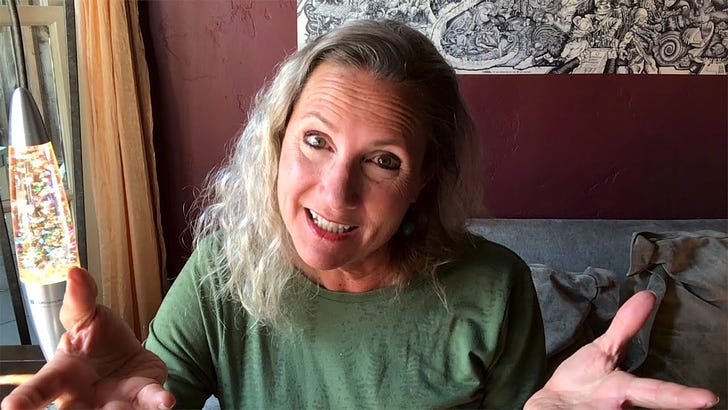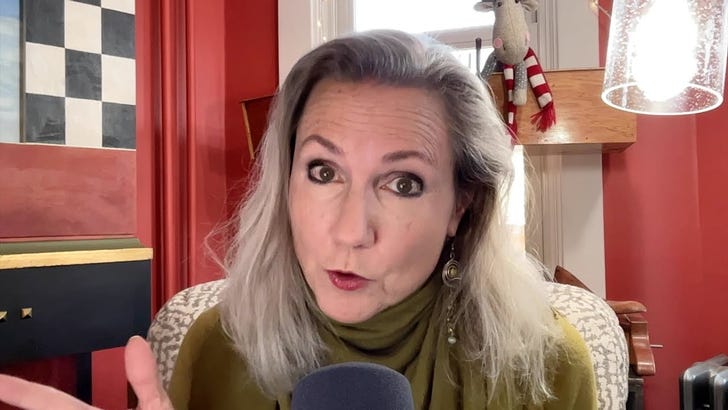MMT & Home Economics
the magic money tree in your own backyard
MMT is Modern Monetary Theory, which is based on a sovereign fiat currency not borrowed from bankers but issued by government. In this episode, I respond to Matt Taibbi's "Magic Monetary Theory Goes Primetime." He looks at the film Finding the Money with Stephanie Kelton and says, "Run!" I answer that Matt is half-right and Stephanie half-wrong. From my book, How to Dismantle an Empire, I show how deficits do turn into someone else's assets—and we need to make sure that someone is our local communities. I end with two personal anecdotes on why it’s ‘too soon to tell.’
In Matt Taibbi’s Racket News, he featured a clip of Biden’s chair of economic advisors failing to explain why the government needs to borrow money if it is the one who prints it. Jared Bernstein flubs the answer … badly.
This was featured in a new film, Finding the Money, whose trailer is below:
Matt writes:
MMT’s high priest is the star of Finding the Money, economist Stephanie Kelton, by all accounts a nice person and loaded to the gills with the currency of the day, certainty. Kelton is sure deficits are fake, part of an age-old political fraud that cons the public into believing national debt is the reason politicians don’t pay for social programs. … the penny drops for audience members as Kelton explains that if you turn the graph of government deficits upside down, the story changes. “Just as a six becomes a nine, when we view it from a different angle, a government deficit becomes a financial surplus,” she says. Not only are deficits not bad, they’re good, because every dollar the government owes is someone else’s asset. Therefore, we can change scary headlines about deficits into awesome ones about surpluses.
Matt’s advice, in a word, is “Run!” He looks at MMT as QE on steroids, quantitative easing gone wild. One of Matt’s most famous quotes compares Goldman Sachs to a “great vampire squid wrapped around the face of humanity, relentlessly jamming its blood funnel into anything that smells like money.” So he’s no fan boy of the banking system but sees Kelton and crew as selling a feel-good, simplistic and dangerous solution that would inflate the dollar like a hot-air balloon.
I’d like to explain why Matt is half-right and Stephanie half-wrong, from the perspective of my book, How to Dismantle an Empire. In it, I use a local form of MMT at the level of the commonwealth, no more than 200,000 people. This is a credit issued by the local government that must, by design, be distributed equally to all members of the community. I call it a caret, which is the roof-shaped symbol on the keyboard (^), not the cone-shaped vegetable. This is significant because the caret is backed by the housing mortgages.
Here are the important differences between MMT and the caret system.
covering our assets
Stephanie states that deficits are good because “every dollar the government owes is someone else’s asset.” A debt to the public sector is money in the pocket of the private sector. But whose pocket? That’s a critical part of the equation.
Of the $29 trillion national debt, $7.6T is owned by foreign countries, notably Japan and China who were at $1T each although China has divested down to $800B and counting. Tax haven countries are big holders, like the UK, Cayman Islands, Luxembourg and Switzerland. Whether they hold them as Treasury bonds, notes or bills, they are all IOUs in exchange for US goods, which we don’t produce, or US real estate, which we are cranking up as high rises in the Sun and Sand Belt.
With China, we run a hefty trade deficit up to $380B per year, although it dropped by $100B last year and seems to be dropping further. This debt to China was backed by their consumer goods. Where did the money come from to buy US Treasuries in the tax havens? The total US mortgage debt is now over $12T and that doesn’t include interest, which is now at 7%, equaling more than the principal repayment. Together they might reach $30T siphoned out of the economy over 30 years, or $1T annually.
What would happen if MMT did a helicopter drop of $1T a year divided into the bank accounts of all US citizens? Mortgages and rents would double. They’re based on the maximum debt anyone can afford relative to their income. So $2T a year would be siphoned out to bank owners. With this dilution of the dollar relative to housing, consumer goods and services would also double. We’d be no better off than before.
drones dropping cash
The $12T issued as mortgage debt by the banks has been conjured out of thin air, the way that Stephanie is suggesting governments should do. But why let bankers own all the houses for this magic trick, while the government’s money is backed by nothing? The mortgage debt would become our asset when transferred to banks owned by the commonwealths.
We don’t need a helicopter drop. The $3T the government owes to the Social Security Trust Fund could issue $30T in loans, by the calculus of the 10:1 bank rule. Since this is $3T that the government owes to itself, it would make sense for them to issue it as credit. This credit can be used to capitalize commonwealth banks.
The national debt doesn’t affect us individually but the need for income equal to our rent or mortgage is the most pressing factor in our life. Stephanie is absolutely right that every debt becomes someone’s asset—you don’t want our debt becoming an asset in a sovereign wealth fund overseas.
The local assets need to equal the debt. In 17 cities in California, Santa Cruz certainly among them, the average mortgage is over a million dollars. That’s ridiculous! But you can put this same amount into the economy, while you’re winding the cost of housing down. In the US, the average mortgage is $245,000. So communities can decide whether to lower the cost of housing or circulate more money in the community to cover it.
Instead of 7% interest loans, the commonwealth can offer 3% refinances. Once the mortgages are debts to the commonwealth, you can issue monthly credits to every person’s bank account as an equal share of the collective payments—something I would do as targeted subsidies for local food production, wellcare, education and home improvement. And if you’re wise, you’ll put measures into place to prevent monopolies and extraction, to encourage local production, and to enable home ownership, small local businesses and small local landlords.
soundbyte economics
Matt is also right: do we really want the government with no limits to its spending? Do we want to give the military a blank check, with the last nine zeroes printed in to save them the trouble?
According to Ron Paul and others, the US would have never entered WWI without the Rothschild expandable purse of the Federal Reserve. Without Rothschild funding the Kaiser, there would have been no Great War to turn into a world war. And he simultaneously funded England and France. All wars are banker’s wars, as has been amply proven.
And Matt is correct that Stephanie’s MMT is simplistic, like Charles Eisenstein’s Sacred Economics and UBI. What appeals to people is free money, where drones and robots do all the work and the government just takes care of us. That’s clearly not what the PTB have in mind for us.
But Matt throws out the MMT baby with the bathwater. Backed by housing at the local level, it could be a system of reciprocity that enables us to take responsibility for ourselves. As the dollar’s trade value teeters on the brink, we may need to take back our own labor when other countries take back their own. Here are some of the articles on the complex and nuanced economic systems that others are developing:
The Cradle on The Greater Eurasia Project: Building Bridges and Breaking Barriers by Pepe Escobar
Counterpunch: America Has Just Destroyed a Great Empire by Michael Hudson
De-dollarization is about more than currencies by Michael Hudson in the Unz Review
Sent by T Jacobsen, Deep State Class War by John Day on Michael Hudson
too soon to tell
As promised, two quick anecdotes in the multicultural tradition of “It’s too soon to tell.”
A couple of days ago, my neighbor was having his house painted. The young guy, nervous on the ladder, dropped a bucket of paint that exploded across the joined driveways. While my neighbor was dealing with his two trucks, he didn’t notice that my car had gotten splattered all over. When he saw it, he asked for the key to take it to his friend’s. I didn’t know if it would be permanent, it seemed pretty bad.
Without a car, I hitched a ride to dance with Lisa and Gina, the teacher who lived in my garaj mahal during the pandemic. Afterwards, we hung out in the backyard just like old times, and I fed them roasted asparagus and Mexican tortilla soup. My neighbor came over and brought back the car, which was gorgeous! His friend was a professional detailer and it was cleaner and shinier than it’s ever been. I told him he needed to mess up more things! He owns two taquerias in town and has all the best connections.
In the other story, I had rented out my AirBnB in my hometown for a music festival, but the air conditioner stopped working. My housecleaner picked up a new one but it was too heavy for her to get it upstairs. So I contacted the guy who’d done a cement walkway for me on my last visit. It turns out they were friends from long-ago, but hadn’t seen each other in five years!
So with all the turmoil in our lives, I think we need to step back and say, “It’s too soon to tell.” This may seem like something that’s going from bad to worse, but may turn out to be the exact thing that needed to happen to turn it all around. It’s just too soon to tell.
My daughter Cassandra has a new question, "what's the best that can happen?" I apply this to global events and the coup to take over our bodies, minds and world. I share some of the things that give me joy: Rob Brezsny's Love Bombs, Wendall Berry's The Power of Place, David Graeber and David Wengrow's The Dawn of Everything, and Caitlin Johnstone's Confused Species in an Awkward Transition Phase.
Describes how to break the power of the bankers and enable distributed economic anarchy, which is self-governance, not chaos. The system change in my book, How to Dismantle an Empire, gives commonwealth banks the sole power to issue mortgages and the credit to repay them. I look at three rules that make it corruption-proof and eight questions for you to decide as czar of your fiefdom.




Tereza, I just finished your book, which is my new favorite! Your analysis of the system and path to a solution are both brilliant, which is a very rare accomplishment. If Wendell Berry’s is the “thing with feathers” your vision to me is “the thing with feet” (and feathers!)
Thanks for all your work, looking forward to the next!
your flowers are beautiful!
makes sense a more local system.